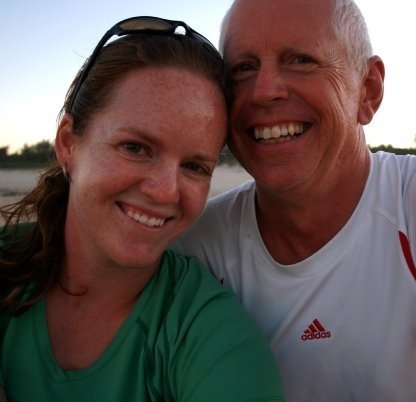We entered a densly forested area and met the entrance to the Ngorongoro Conservation Area. This reserve sits beside Serengeti National Park, and includes the unique Ngorongoro Crater, which some call the eighth Wonder of the World. The crater is the remains of an extinct volcano, which collapsed thousands of years ago to form the 20km-diameter caldera, whose rim sits some 600m above the crater floor below. We wouold be spending Christmas Eve camping at the rim and half of Christmas Day exploring the diverse and densly populated wildlife that calls it home, so more about this later. We did stop at the rim for a breathtaking view out over the crater, and we could easily spot elephants and buffalo as tiny specks far below. It was interesting to note that a monument was erected to commemorate the various people who died here while working to establish the reserve; causes of death included road accident, plane crash, shot by poacher, and rhinocerous.
We drove around the south side of the crater and continued west, down the volcanoe's western slopes. Maasai villages and cattle herds were everywhere, also visited by the occasional ostrich or gazelle. As we passed a herd of about 30 giraffes during our descent, the massive Serengeti Plains unfolded in front of us. It looked just as I had pictured... wide flat grassy plains stretching as far as the eye could see, with some isolated mountains in the distance and flat-topped acacia trees sprinkled here and there. The road was long and straight, and busy since it is the main access into the park. We passed herds of zebras, tons of ostriches, a few warthogs, tons of gazelles, and a few of those weird kori bustard birds we saw at Etosha. Then we turned off for a lunch stop, which I was thrilled to learn would be at Olduvai Gorge! Most people in the group had never heard of this place, but having taken an archaeology course in university, I knew all about it! This spot is where Louis and Mary Leaky unearthed the evidence of the earliest human ancestors ever found. They found skulls, tools, and all kinds of proof of homo habilis, dating back 1.8 million years. At a site called Leotoli, several miles from here, they later found footprints belonging to our earliest upright-walking ancestors, dated to 3.6 million years ago. Incredible stuff. Anyway, after hearing so much about it, it was very satisfying to stand at the edge of the gorge where it all happened and see the museum displays of their work, the geology, and the proof itself. Somehow it's not hard to believe that this part of the world was likely home to the original human beings on earth - a place they have termed 'the cradle of humankind'.
Onwards, we carried on across the plains and crossed the border out of the Ngorongoro Conservation Area and into Serengeti National Park. The distant mountains became more sparse, and Maasai herdsmen were no more since they are restricted to the Ngorongoro. Our animal spotting eyes were glued to the savannah, and we came across a Secretary bird, a herd of giraffes perfectly placed beside acacia trees to comprise that idealized African postcard shot, and even a group of three sleepy lionesses dozing by a waterhole, bellies obviously full and lying wih all four paws in the air - so cute! None of them even bothered to raise their heads or even do more than turn an ear in our direction. Another lioness was spotted later, lounging high up on a huge boulder as if she owned the place. A low spot had a few feet of water in it, which was home to a bunch of hippos and a lone crocodile. Hartebeest, topies, bat-eared foxes, eagles, impala... animals were everywhere! As we turned off the main road toward the Seronera campsite, the sun beamed down through the clouds onto the plains, leaving silhouettes of acacia trees and a misty sunset. It was such an awesome feeling to soak it in from the open-top safari truck, the afternoon sun warm on our backs and miles of Serengeti dirt covering our skin and our clothes. Ahhhh, Africa!
Giraffes were within a hundred feet of our campsite when we pulled in, and we were warned to watch for any of the animals that could quite likely wander amongst our tents. Lions, hyenas, and elephants topped the caution list. We dined on spicy coconut chicken curry as the sky turned orange and purple, marking the end to another spectacular day in Africa. With only a couple days left, we're soaking in every moment of it because this really is a once in a lifetime sort of place.












No comments:
Post a Comment